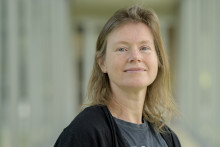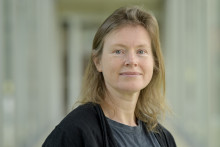S&T situation
How is the Faculty of Science & Technology doing now, barely six months after the reorganisation was implemented? U-Today spoke with the faculty board, an employee threatened with dismissal and with those left behind. This is part 1, about the reversal of the dismissal of Professor Kerensa Broersen.
After she was threatened with dismissal last February, she was 'at rock bottom’ for three weeks, says Professor Kerensa Broersen. 'I was not able to look at my resignation letter for those three weeks. However, I did forward the letter to two colleagues during that period. I immediately got back from both: you have to look in the letter, something is not right.'
'I was surprised to read the two reasons for my dismissal: my research was not in line with the sharpened profile of the faculty and I was supposedly not teaching enough.' Her research was described in that letter. 'When I read it, I thought: is this about me? My PhD students and postdocs also pointed it out to me: this text was about my research from fourteen years ago.'
She was also able to refute the education argument. 'I have an appointment of 0.5 FTE at the UT. Research grants have certain criteria, including the number of hours you are allowed to spend on something other than research. After some calculations, I came to the conclusion that according to those criteria I just provide structural education in my own time. Not that that's necessarily a bad thing, though. But 'too little education', that wasn't right either.'
'To be honest, I don't understand why a dated text about my research ended up in a letter of dismissal'
Appeal
What stung her all the more was that both her research and teaching activities had been discussed a few months before that particular day in February. 'In a conversation with the appointment advisory committee, in preparation for my inaugural lecture this autumn. In the presence of the dean, of course. To be honest, I don't understand why a dated text about my research ended up in a letter of resignation and everything that was said four months before seems to have been completely forgotten. My research has developed extensively in my fourteen years here, coincidentally in recent years exactly in the direction where the faculty wants to go.'
Broersen decided to file an appeal. 'Purely on the content. It's take it or leave it.' Still, she didn't have much faith in a good outcome. 'I also spoke to others who had taken similar routes, who were eventually told that their appeal was deemed to be unfounded. It took a long time before I got a response – and in the meantime I had discussions with another faculty and other universities.'
On a Monday morning, while her daughter was lying in the dentist's chair to have a cavity filled, she received an email from interim dean Wiendelt Steenbergen. She was allowed to stay, the dismissal was reversed. 'You can imagine that my exuberant reaction was a bit of a shock for my daughter – and the dentist.'
'My team has suffered immensely lately. Much remained unclear for a long time'
Mixed feelings
Despite the good news, something gnawed at the professor. 'On the one hand, I was very relieved; I was no longer on the seesaw. Moreover, this faculty, and especially the Applied Stem Cell Technologies group, is a very good fit for me and my research. In addition, with the intensive collaboration with various departments at EEMCS and the job satisfaction that I have always experienced at the UT, I wanted to continue constructively. On the other hand, my team has suffered immensely lately. Much remained unclear for a long time. Would my PhD students and postdocs now have a different supervisor? And does that person have sufficient knowledge? That never came to light in recent months. Of course, this applies not only to my team, but also to the teams of professors who eventually disappear.'
Response of the Faculty Board
Interim dean Wiendelt Steenbergen responded to the reversal of the dismissal in another interview: 'After I looked deeper into it, I came to the conclusion that Kerensa Broersen was right. That is purely for substantive reasons, not because of external pressure or anything like that. I want to leave no doubt whatsoever about her position and that her research is a good fit for this faculty. And it is certainly not on the so-called edge, even if something were to shift in the future.'
There was more going on. 'Eventually it would become known quickly, so it also went through my mind how colleagues would react. Especially colleagues who were ultimately dismissed. I feel burdened. For example, was the correct procedure followed when they were dismissed? Have you put forward the right arguments? What is their perspective? What are the implications for their teams? And also: how can I move forward myself? A lot has happened...'
'There is plenty of speculation. I don't want my name to be dragged through the mud'
Broersen talked to interim dean Steenbergen. 'A series of discussions has now been initiated, both with Wiendelt and with HR. It is important to me that not only my head can continue, but that I can choose the UT again with my whole being. That takes time.'
Taking responsibility
These discussions are about the impact on her team, herself and her research. 'But also about the impact on other teams and other employees. I had three large applications for research funding pending. One of them was rejected because one of the conditions was that I had to have a permanent appointment. Gradually I get the impression that the impact of this reorganisation is starting to dawn on the faculty board; open, transparent, authentic and honest communication is essential in this. Being able to say: 'we made mistakes' is part of that.'
She has asked the faculty board to communicate openly about the error. 'I expect them to take responsibility, because in the meantime I hear that there is talk about the reasons behind the reversal of my dismissal. That I would have hired a devious lawyer, or that I managed to talk my way out of it, there is plenty of speculation. I don't want my name to be dragged through the mud. It would be nice if colleagues with questions just ask me directly. And that the Faculty Board also takes its responsibility in this.'
'Don't shy away from conversations'
The reorganisation is still simmering hard in the faculty – and outside – the professor knows. 'For students, graduation assignments are cancelled, or they are delayed. With the dismissal of their professor, PhD candidates not only lose their supervisor, but also their anchor in academia. And it also impacts other places; If you fire one safety officer and transfer others, that does not mean that safety in a lab is immediately back in order. In such cases, it is very specific, non-interchangeable knowledge. You can't fill in such a reorganisation via an Excel sheet.'
'My head can just go on. But I also said that I should be able to continue with my whole body and limbs'
According to Broersen, more appeal could and should have been made to the knowledge within the faculty. 'There is enough collective IQ available to come up with good savings solutions. Perhaps the conclusion will still be that reorganisation is necessary, but then you have involved the work floor. You can't avoid possible resistance to a strategic plan by avoiding the conversations.'
'My head can go on'
For herself, she would like to continue. 'There is every reason for that, but my trust in the organisation was severely damaged. That trust must return. There will be a new dean, which is a step in recovery. In any case, I want to have a clear statement in my personnel file about what happened. That I shouldn't keep looking over my shoulder. It is still unclear to me who was ultimately involved in the decision to fire me.'
This lack of clarity continues to give feelings of doubt. 'My head can go on. But I also said that I should be able to continue with my whole being. I don't want to have to defend myself against things that happened through no fault of my own. I prefer to leave it behind me and throw myself back into my research with full conviction. Let's talk about that again soon. About intestines and brains, about stem cells and chip technology and what exciting questions we can answer with them. That’s a much nicer topic to talk about, right?'





